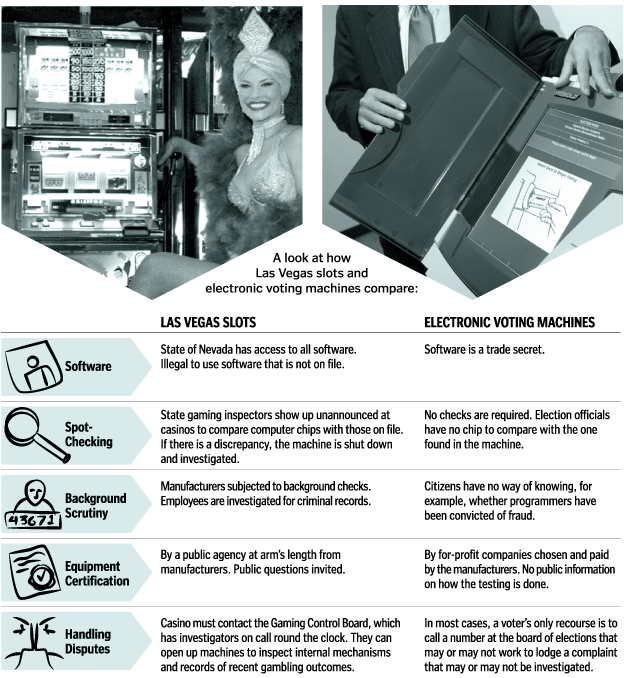April 18, 2006
Voting and more from the Red Queen
Cubicle points to a great article that contrasts voting machines with gambling machines.
It's easier to rig an electronic voting machine than a Las Vegas slot machine, says University of Pennsylvania visiting professor Steve Freeman. That's because Vegas slots are better monitored and regulated than America's voting machines.
Of course the gambling machines come out on top - they are more carefully governed because the nature of the money is very very clear. With a voting machine, you the punter has no clear picture of how it is being used to reach into your pocket, and your natural skepticism is swept aside by airy fairy claims of democracy and honesty of our public process blah blah.

In contrast to that rosy view of gambling governance, Risks points out that:
Casino can reprogram slot machines in seconds <"Peter G. Neumann"> Wed, 12 Apr 2006 11:10:27 PDTAs an enormous operational improvement, the 1,790 slot machines in Las Vegas's Treasure Island Casino can now be reprogrammed in about 20 seconds from the back-office computer. Previously this was an expensive manual operation that required replacing the chip and the glass display in each machine. Now it is even possible to have different displays for different customers, e.g., changing between "older players and regulars" during the day and a different crowd at night ("younger tourists and people with bigger budgets". (Slot machines generate more than $7B revenue annually in Nevada.) Casinos are also experimenting with chips having digital tags that can be used to profile bettors, and wireless devices that would enable players to gamble while gamboling (e.g., in swimming pools!). [Source: Article by Matt Richtel, Prefer Oranges to Cherries? Done! *The New York Times*, 12 Apr 2006, C1,C4; PGN-ed]
Well, the WaPo story was nice while it lasted. More from Risks, there are reports that votes of lesser importance were interfered with. Going to the sources:
Washington voting hijacked by computer mischiefAn online poll asking Washingtonians to pick their favorite design for the state's quarter coin was suspended, after the balloting was hijacked by computer programs whose automated scripts pushed the tally past 1 million votes over the weekend. State officials overseeing the balloting originally decided not to limit the number of votes coming from individual computers so that family members sharing a single machine could each cast a vote, Gerth said. But that philosophy was being abandoned after the weekend's voting, which showed some computers casting repeated votes for a quarter design faster than humanly possible.
[Source: Associated Press item, seen in *The Seattle Times*, 12 Apr 2006; PGN-ed]
DoIT Information on ASM Election IssuesMore specifically, DoIT detected a disparity between the number of student votes cast and the number of votes confirmed in the online election database. In the Student Council portion of the election, 94 more ballots were cast than were posted; in the referenda portion, 436 more ballots were cast than posted. After further investigation today, DoIT determined that there were no additional discrepancies in the referenda
I wrote before on the monetary aspects of voting. The first story above is about money, but it hardly seems monetary. The second is more of a political issue - but such polls often lead to power and money.
The question then arises if in any voting system it is unreasonable to assume 'honest' behaviour, even if the poll is over issues of no direct importance? Is it therefore better to assume that in any voting system, some small group of users will manipulate if given the chance? Even if there is no benefit to them?
The system of voting I wrote about last week solved this problem -- in the face of prior efforts to increase unimportant ratings fraudulently -- by checking identity on handing out the tokens. That's pretty boring. But if we decide that the only solution to proper democracy is a strong identity society, there's an awful lot of waste there, not to mention risk of identity abuse.
Posted by iang at April 18, 2006 11:35 AM | TrackBackI think, I am not the only one, who, given the choice between privacy and democracy would choose privacy with no hesitation.
Posted by: Daniel A. Nagy at April 18, 2006 08:18 AM